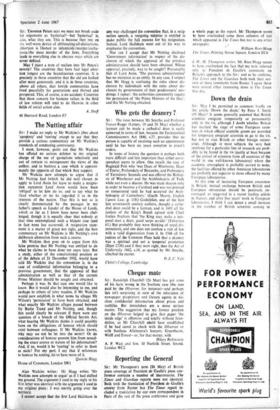The Nutting affair
Sir: I make no reply to Mr Watkins's jibes about 'apoplexy' and 'ranting' except to say that they provide a curious commentary on Mr Watkins's standards of conducting controversy.
I must, however, point out that Mr Watkins has offered no serious defence to my original charge of the use of quotations selectively and out of context to misrepresent the views of the author, and to buttress a case which is approxi- mately the opposite of that which they support Mr Watkins now attempts to argue that if
Mr Nutting had (which he did not) chosen to apply to Lord Avon for leave to make a resigna- tion statement Lord Avon would have been 'obliged' to let him do so, and to say what he liked whether or no he regarded it as in the interests of the nation. That this is not so is clearly demonstrated by the passages in my father's speech as Leader of the House of Lords, which so far as I know have never been chal- lenged, though it is equally clear that nobody at that time contemplated such a blatant case (and in fact none has occurred). A resignation state- ment is a matter of grace not right, and the best commentary on Mr Watkins is Mr Nutting's own deliberate abstention from such a course.
Mr Watkins then goes on to argue from this false premise that Mr Nutting was entitled to do what he claims to have done ten years later. But a study, either of the constitutional position or of the debate of 21 December 1932, would have told Mr Watkins that the convention is, in the case of confidential information belonging to a previous government, that the approval of that administration as well as that of the current Prime Minister should be sought and obtained.
Perhaps it was. In that case one would like to know. But it would also be interesting to me, and perhaps to others of your readers, if Mr Watkins would now establish in what terms he alleges Mr Wilson's 'permission' to have been obtained, and what exactly Mr Watkins alleges passed between Sir Burke Trend and Mr Nutting, and, though this could clearly be relevant if there were any question of a breach of the Official Secrets Act, what bearing Mr Watkins thinks it could possibly have on the obligations of honour which should exist between colleagues. If Mr Watkins knows, why may we not be let into the secret? Or do considerations of honour prevent him from reveal- ing the exact source or nature of his information? And, if so, would it be 'ranting' to refer to them as such? For my part, I say that if references to honour be ranting, let us have more of it.
Alan Watkins writes: Mr Hogg writes `Mr Watkins now attempts to argue' as if I had shifted my ground. The argument I used in my reply to his first letter was identical with the argument I used in my original piece: I was merely going over the territory.
I cannot accept that the first Lord Hailsham in
any way challenged the convention that, in a resig- nation speech, a resigning minister is entitled to make public the full reasons for his resignation. Indeed, Lord Hailsham went out of his way to emphasise the convention.
Nor can I accept that Mr Nutting disclosed 'Government information' in respect of the dis- closure of which the approval of the previous administration should have been obtained. Whose approval, precisely, was to be sought? Presumably that of Lord Avon. The previous administration' has no existence as an entity. In any case, I suspect that Mr Hogg is confusing the rules about dis- closure by individuals with the rules about dis- closure by governments of their predecessors' mis- doings. I repeat: the authorities consistently require the permission of 'the Prime Minister of the Day'; and this Mr Nutting obtained.


































 Previous page
Previous page